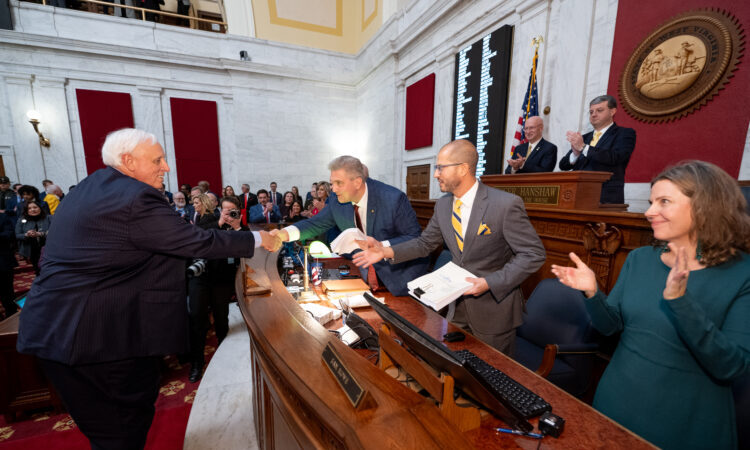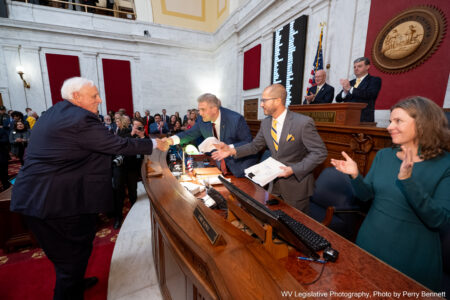Answers Demanded In State Handling Of U.S. Dept. of Education COVID Funding | News, Sports, Jobs


Photo courtesy of WV Legislative Photography
From left, Gov. Jim Justice hands his proposed budget to House Clerk Steve Harrison and Senate Clerk Lee Cassis during his State of the State address on Jan. 10. Legislative Democrats are demanding answers about the state’s handling of federal COVID education funding.
CHARLESTON – As the clock ticks down to the end of the 2024 legislative session Saturday, lawmakers are working on a budget for the next fiscal year with questions remaining over a pending waiver of nearly half-a-billion dollars West Virginia might have to dump into education spending.
In a press conference Monday morning, members of the House Democratic caucus demanded answers from Gov. Jim Justice and the Republican majority over negotiations between the state and the U.S. Department of Education to waive federal requirements to meet a required education spending threshold to avoid having a clawback of more than $1.1 billion in COVID-19 education grants.
“We are demanding answers right now,” said House Minority Leader Sean Hornbuckle, D-Cabell. “The people of West Virginia deserve transparency and be able to have a government that they can trust.”
It was revealed last week during a House Finance Committee meeting where the budget bill for fiscal year 2025 beginning in July was presented that the state is in negotiations for the U.S. Department of Education for the second year in a row over the fiscal year 2023 maintenance of effort (MOE) waiver requirements.
As a result of accepting more than $1.1 billion through three tranches of COVID-19 education funding via the U.S. Department of Education’s Elementary And Secondary School Emergency Relief Funds (ESSER), the state was required to maintain a certain percentage of total education spending based on spending during the three fiscal years prior to the start of the pandemic. That percentage was 41.6%, but the state fell short of that percentage in fiscal years 2022 and 2023.
The state applied for a waiver from this requirement in 2022, explaining that due to the state’s student aid formula and how education is funded in the state, direct funding of education was difficult.
Instead, the state demonstrated compliance by showing how education was funded in alternative ways, including pay raises, stabilization of the Public Employees Insurance Agency, funding for deferred maintenance and new school construction, the Communities in Schools program, and other spending. The state was granted its first waiver in 2023.
However, West Virginia is facing a similar problem for its fiscal year 2023 reporting, with total education spending only at 34.7%. Unless the state receives a second waiver, West Virginia would have to spend $465 million in order to get the total education spending up to the 41.6% benchmark. If the state doesn’t do that, it could result in a clawback by the U.S. Department of Education of some of the $1.1 billion awarded to West Virginia.
“That’s about 10% of our budget,” said Del. John Williams, D-Monongalia. “I don’t know if we have access to these funds or not if we’re going to be able to pay it.”
“It’s a blindside for us. It’s blindside for you. It’s not a blindside for the people that are in charge. That’s what it comes down to,” Hornbuckle said. “We’ve got to figure out this mismanagement first. We’re really troubled by it.”
In a statement over the weekend, Gov. Jim Justice said their negotiations with the U.S. Department of Education have been fruitful and he expects to receive a waiver soon. But he criticized the department’s maintenance of effort rules, which were not finalized until 2022, which he said penalized the state for ending the last two fiscal years with more than $1 billion in tax revenue surpluses.
“The sole issue raised in the federal rules is whether West Virginia’s spending on education rose enough in proportion to the state’s overall spending,” Justice said. “The federal rules, however, focus on percentages. They penalize West Virginia for its economic success and investing in roads, infrastructure, and bringing good-paying jobs to West Virginians, despite our increased investment in our schools.”
While state officials are optimistic about receiving the waiver, the news has put a renewed spotlight on the budget bill, which traditionally is finalized the last week of the session. Both budget bills – House Bill 4025 and Senate Bill 200 – were advanced in the House Monday to third reading with right to amend.
Justice’s introduced budget for the FY25 general revenue budget was $5.265 billion, which was a 7.8% increase – or $381 million – from the $4.884 billion fiscal year 2024 budget that went into effect in July. The Senate’s version of the budget bill is $4.934 billion, which is a 1% increase from the current fiscal year but a 6.3% decrease from Justice’s recommended budget of $5.265 billion. The House version of the budget was just over $5 billion, which is nearly 5% less than the governor’s introduced budget and 1.4% more than the Senate budget bill.
Justice urged lawmakers to pass a budget as close to his recommended budget bill as possible, including a fifth-year-in-a-row pay raise proposal for state employees, teachers, school service personnel, and West Virginia State Police employees; and $150 million for the School Building Authority to fund all remaining construction requests.
“Again, I’m confident that we will reach a positive resolution quickly, and I call on the Legislature to act swiftly on my proposed budget, including the historic pay raise for educators and the unprecedented funding for our School Building Authority,” Justice said. “This isn’t just about meeting federal expectations; it’s about our ongoing commitment to improving education for all West Virginians.”
The Legislature could be poised to do just that. The House is set to pass Senate Bill 653 Tuesday, providing $150 million for SBA. But the Senate Finance Committee removed the stand-alone bill for teacher/staff/state police raises off its afternoon agenda Monday.
But Republican lawmakers have also floated passing a skinny budget, then returning later this spring in a special session to beef the budget back up once the waiver has been approved. That plan did not sit well with members of the Democratic minority.
“Even if we do come back in May to fix it, we had a job to do these 60 days and we haven’t done it,” Williams said. “Where we are right now is we are in a position where we want to see a budget that is funded, that keeps the promises that were made on day one during the State of the State some 55 days ago.”
House Minority Leader Pro Tempore Kayla Young, D-Kanawha, pointed out that several of the governor’s budget priorities laid out during his eighth and final State of the State address at the start of the 2024 session on Jan. 10 are no longer in the budget, including a childcare tax credit, funding for a new agriculture lab at West Virginia State University in Institute, funding for rural hospitals, or funding for flood mitigation.
“We want to restore some of the governor’s promises,” Young said. “In the last few days of this session – we’re on day 55 today – our caucus is absolutely committed to focusing on the people of West Virginia and putting our money where our mouth is.”






